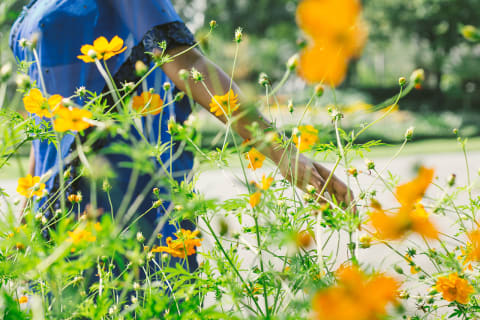Okay, great. Now how the heck do we do that? Well, my sniffling sufferers, the first thing is to get off the anti-histamines. I know, I know. But think of it this way: anti-histamines do not stop the body from producing histamines. “Instead, they block the action of histamines at receptor sites (Michael Murray, N.D.).” They actually encourage the immune system to overreact, causing a greater sensitivity to allergens.
- Nettles (Urtica dioica): I’ve said this before, but when in doubt, choose nettles. Nettles are a fantastic tonic for the immune system and help the body learn to cope with its over-reactive nature. You can try a big jug of nettle tea. Grab a quart jar, about a half cup of nettle leaves (dried or fresh—use twice as much if you’re using fresh herb and wear gloves! These aren’t called stinging nettles for nothing) and pour boiling water over the herb. Steep overnight if you can, but a few hours will do the trick. Drink 2-4 cups a day—hot or iced. You’ll probably find that this is the only herb you need—give it a couple of weeks of daily drinking before weaning off the allergy meds, though. Give your body a chance to heal (although, if you’re feeling better, there’s no reason why you can’t cut back earlier).
- Angelica (Angelica sinensis)—also known as dong quai in Traditional Chinese Medicine (TCM): Angelica is a tall, sturdy, gorgeous plant (if you ever have the good luck to see one growing, you’ll know what I mean; you’ll feel totally safe knowing a plant like this has got your back). Angelica decreases the amount of antibodies your body produces when faced with allergens. This action helps to educate the body that it need not freak out in their presence. A wonderfully soothing tonic for the body, you can use this safely with nettles. I recommend finding a tincture of this plant—this will probably be easier than finding a tea or the dried herb itself. Follow the directions on the tincture bottle (note: directions on supplement bottles are usually for a 150lb adult—increase or decrease proportionally according to your weight).
- Licorice (Glycyrrhiza glabra): Licorice is similar to cortisone (aka steroids): it stimulates (but heals!) the adrenal glands and inhibits inflammation (which is what makes you so flipping uncomfortable during allergy season) and it does all of this without all the nasty steroid side-effects. Try this one if you’re having an acute attack, but stick with nettles or angelica for daily, tonic use. Long term use of licorice can deplete your potassium levels and cause sodium retention (so people with high blood pressure should probably avoid this herb).
Now, there are some herbs that, if you suffer from allergies, you should probably avoid until you get them under control. For example:
- If you are allergic to ragweed avoid the following (all in the ragweed plant family):
No matter what you’re allergic to or what symptoms you suffer from, try out one of the herbs above (Did I mention nettles? You should really try nettles) for a few weeks, then treat yourself to an experimental picnic (under some trees, or maybe next to a field of goldenrod) and sneeze no more. *Can’t forget the herbalists’ standard disclaimer: Talk to your doctor before using any type of alternative medicine.



